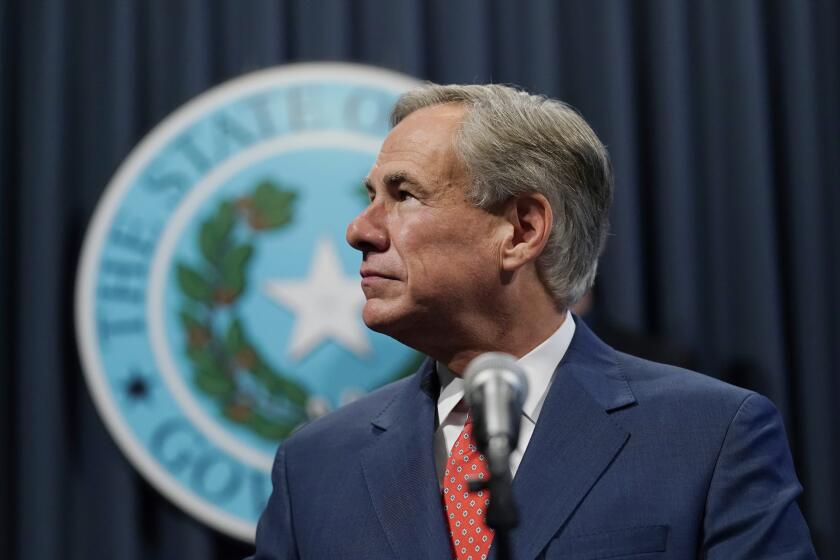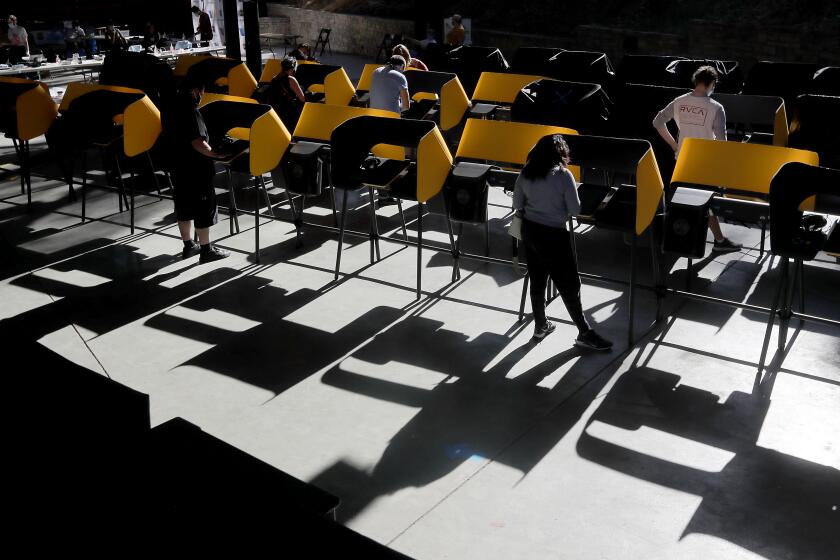Column: Republicans aren’t protecting elections. They don’t want democracy

The next time Speaker Mike Johnson (R-La.) stands in front of a microphone to talk about election integrity, I want you to remember this: Nearly a third of voters in Louisiana are Black, and yet Black voters had control over less than 20% of the state’s congressional districts. White voters make up less than 60% of the electorate yet had control over more than 80% of the power.
Opinion Columnist
LZ Granderson
LZ Granderson writes about culture, politics, sports and navigating life in America.
When the Democratic governor vetoed attempts to suppress the Black vote, the Republican state Legislature overrode the veto. When a federal judge said another map should be drawn, the Supreme Court delayed action until it had decided a similar question about Alabama.
In that state, Black people are more than a quarter of the population but had control over just one of the state’s seven districts. For two years, Alabama fought to dilute the Black vote, until the highest court of the land rejected the state’s final plea for a gerrymandered map.
The new political map intentionally diminishes the sway of Latino and Black voters by attaching their communities to heavily white districts.
Johnson’s party has been working to suppress Black votes for decades, so what is he talking about when he trumpets “election integrity”?
His appearance with former President Trump at Mar-a-Lago earlier this month was ostensibly about an election reform bill, meant to address a crisis those two men love to hype: the claim that millions of noncitizens are voting in our elections. The facts show that claim isn’t true. What is true is that within months of taking office in 2017, Trump established a commission to investigate his unsubstantiated claims of widespread voter fraud in the 2016 election, and the Republican-led group — which included a handful of conservative secretaries of state — didn’t find anything.
It would be such an easy way to improve voting access.
It’s also true that we are approaching the 60th anniversary of the Voting Rights Act of 1965, and the same Jim Crow states that opposed Black people voting then are the same states in court today opposing Black representation.
That includes Louisiana, the state Mike “Election Integrity” Johnson hails from.
During the civil rights movement, the Louisiana congressman James Morrison, a Democrat, voted in favor of the Voting Rights Act. He suddenly became vulnerable in the primary. Morrison went on to accuse his opponent John R. Rarick of being a member of the Ku Klux Klan, which the FBI confirmed. Morrison lost anyway, and Rarick won the seat. In 1973 Rarick introduced a bill in the House to repeal the Civil Rights Act. In 1988 David Duke, a Grand Wizard of the KKK, ran for president. In 2022 a map was drawn to suppress the Black vote. In January a new map to include a second Black district was approved. In February there was another lawsuit to try to stop it.
Those Southern states have been consistent in their agenda. In Rarick’s day some of the bad actors, including him, were Democrats, but now the cause has been taken up by Republicans. And why is today’s GOP so concerned about “protecting” elections? Why are they fighting so hard to stop democracy? Because they don’t want a democratic outcome. They want white control.
Johnson wants you to believe it’s the desperate migrants and asylum seekers at the southern border who are the greatest threat to democracy.
No, Mr. Speaker: It is and always has been racism. It’s baked into our nation.
When you look up the origins of the electoral college on the National Archives website, it tells you that “the Founding Fathers established it in the Constitution, in part, as a compromise between the election of the President by a vote in Congress and election of the President by a popular vote of qualified citizens.”
However, what it doesn’t say is why a compromise was needed in the first place. If the majority of people have already spoken in the election, why does Congress need a say? The answer is rooted in what William Buckley wrote in his 1957 essay “Why the South Must Prevail”: “It is more important for any community, anywhere in the world, to affirm and live by civilized standards, than to bow to the demands of the numerical majority.”
Need I remind you of what was considered “civilized standards” in the South in 1957? Need I remind you how little has changed?
That’s by design — from the establishment of the electoral college to today. If Johnson cares about protecting democracy, the facts point to where he should start. Other lawmakers are ahead of him.
Maine recently became the 17th state, in addition to the District of Columbia, to join the National Popular Vote Interstate Compact, an effort to have the popular vote — and not the electoral college — determine who wins the White House. There is still a question of whether this attempt to rid the country of the racist electoral college requires congressional approval. But it does demonstrate a hunger for democracy.
“I struggle to reconcile the fact that a candidate who has fewer actual votes than their opponent can still become president of the United States,” Gov. Janet Mills of Maine said in a statement recently. “It seems to me that the person who wins the most votes should become the president. To do otherwise seemingly runs counter to the democratic foundations of our country.”
While I agree with her sentiment, the electoral college wasn’t counter to foundations. Concessions to appease racism are written throughout the Constitution. The electoral college is just one of a number of examples.
The border crisis has nothing to do with what has always been democracy’s biggest threat.
More to Read
A cure for the common opinion
Get thought-provoking perspectives with our weekly newsletter.
You may occasionally receive promotional content from the Los Angeles Times.














